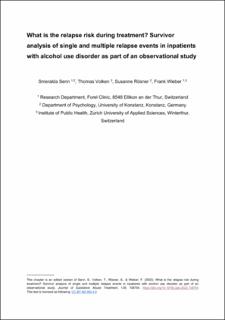Please use this identifier to cite or link to this item:
https://doi.org/10.21256/zhaw-24727Full metadata record
| DC Field | Value | Language |
|---|---|---|
| dc.contributor.author | Senn, Smeralda | - |
| dc.contributor.author | Volken, Thomas | - |
| dc.contributor.author | Rösner, Susanne | - |
| dc.contributor.author | Wieber, Frank | - |
| dc.date.accessioned | 2022-03-31T09:04:28Z | - |
| dc.date.available | 2022-03-31T09:04:28Z | - |
| dc.date.issued | 2022-02-23 | - |
| dc.identifier.issn | 0740-5472 | de_CH |
| dc.identifier.issn | 1873-6483 | de_CH |
| dc.identifier.uri | https://digitalcollection.zhaw.ch/handle/11475/24727 | - |
| dc.description.abstract | Introduction: During treatment for alcohol use disorder (AUD), about 40% of patients return to drinking. Whether the risk of relapse changes during treatment and how relapses may affect the risk of subsequent relapse are unclear, however. The current study, therefore, aims to identify when and with what probability relapses occur. Methods: One hundred and three inpatients at an AUD treatment center participated in this observational study. The study documented relapse to drinking using breath analyzers, urine tests, and self-reported incidents for 42 days after the start of treatment. Time to the first relapse event and to any subsequent relapse event served as the outcome measures. The study determined the proportion of patients who had not experienced a relapse event at any given point by Kaplan-Meier estimates and Cox proportional hazards models. The study team computed the instantaneous probability of experiencing an event at any given point using generalized estimating equation (GEE) models of the binomial family with log-link and exchangeable correlation structure to estimate unadjusted and adjusted hazards. Results: Whereas the hazards of experiencing a first relapse event declined steadily over the 42 days, the hazards of experiencing a subsequent relapse following an initial event remained stable. Both first-time and recurrent relapses were positively associated with the number of DSM-5 AUD criteria. Conclusion: Whereas the risk of relapse declines with each day of abstinence during treatment, it remains high after an individual relapse for the first time. This finding implies that therapy should focus on strengthening selfefficacy for low-risk groups and on relapse-prevention strategies for high-risk groups. | de_CH |
| dc.language.iso | en | de_CH |
| dc.publisher | Elsevier | de_CH |
| dc.relation.ispartof | Journal of Substance Abuse Treatment | de_CH |
| dc.rights | Licence according to publishing contract | de_CH |
| dc.subject | Alcohol use disorder | de_CH |
| dc.subject | Relapse | de_CH |
| dc.subject | Survival analysis | de_CH |
| dc.subject | Treatment | de_CH |
| dc.subject.ddc | 616.8: Neurologie und Krankheiten des Nervensystems | de_CH |
| dc.title | What is the relapse risk during treatment? : survivor analysis of single and multiple relapse events in inpatients with alcohol use disorder as part of an observational study | de_CH |
| dc.type | Beitrag in wissenschaftlicher Zeitschrift | de_CH |
| dcterms.type | Text | de_CH |
| zhaw.departement | Gesundheit | de_CH |
| zhaw.organisationalunit | Institut für Public Health (IPH) | de_CH |
| dc.identifier.doi | 10.1016/j.jsat.2022.108754 | de_CH |
| dc.identifier.doi | 10.21256/zhaw-24727 | - |
| dc.identifier.pmid | 35277308 | de_CH |
| zhaw.funding.eu | No | de_CH |
| zhaw.originated.zhaw | Yes | de_CH |
| zhaw.publication.status | publishedVersion | de_CH |
| zhaw.volume | 108754 | de_CH |
| zhaw.publication.review | Peer review (Publikation) | de_CH |
| zhaw.author.additional | No | de_CH |
| zhaw.display.portrait | Yes | de_CH |
| Appears in collections: | Publikationen Gesundheit | |
Files in This Item:
| File | Description | Size | Format | |
|---|---|---|---|---|
| 2022_Senn-etal_What-is-the-relapse-risk-during-treatment-survivor-analysis-alcohol-use-disorder.pdf | Accepted Version | 504.72 kB | Adobe PDF |  View/Open |
Show simple item record
Senn, S., Volken, T., Rösner, S., & Wieber, F. (2022). What is the relapse risk during treatment? : survivor analysis of single and multiple relapse events in inpatients with alcohol use disorder as part of an observational study. Journal of Substance Abuse Treatment, 108754. https://doi.org/10.1016/j.jsat.2022.108754
Senn, S. et al. (2022) ‘What is the relapse risk during treatment? : survivor analysis of single and multiple relapse events in inpatients with alcohol use disorder as part of an observational study’, Journal of Substance Abuse Treatment, 108754. Available at: https://doi.org/10.1016/j.jsat.2022.108754.
S. Senn, T. Volken, S. Rösner, and F. Wieber, “What is the relapse risk during treatment? : survivor analysis of single and multiple relapse events in inpatients with alcohol use disorder as part of an observational study,” Journal of Substance Abuse Treatment, vol. 108754, Feb. 2022, doi: 10.1016/j.jsat.2022.108754.
SENN, Smeralda, Thomas VOLKEN, Susanne RÖSNER und Frank WIEBER, 2022. What is the relapse risk during treatment? : survivor analysis of single and multiple relapse events in inpatients with alcohol use disorder as part of an observational study. Journal of Substance Abuse Treatment. 23 Februar 2022. Bd. 108754. DOI 10.1016/j.jsat.2022.108754
Senn, Smeralda, Thomas Volken, Susanne Rösner, and Frank Wieber. 2022. “What Is the Relapse Risk during Treatment? : Survivor Analysis of Single and Multiple Relapse Events in Inpatients with Alcohol Use Disorder as Part of an Observational Study.” Journal of Substance Abuse Treatment 108754 (February). https://doi.org/10.1016/j.jsat.2022.108754.
Senn, Smeralda, et al. “What Is the Relapse Risk during Treatment? : Survivor Analysis of Single and Multiple Relapse Events in Inpatients with Alcohol Use Disorder as Part of an Observational Study.” Journal of Substance Abuse Treatment, vol. 108754, Feb. 2022, https://doi.org/10.1016/j.jsat.2022.108754.
Items in DSpace are protected by copyright, with all rights reserved, unless otherwise indicated.